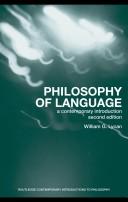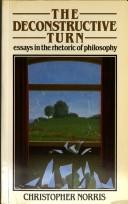| Listing 1 - 6 of 6 |
Sort by
|
Book
ISBN: 0262367351 0262367343 0262543133 Year: 2021 Publisher: Cambridge : The MIT Press,
Abstract | Keywords | Export | Availability | Bookmark
 Loading...
Loading...Choose an application
- Reference Manager
- EndNote
- RefWorks (Direct export to RefWorks)
"A short philosophy of language book on quotation that maps out the history of the topic and offers a new approach to it"--
Book
ISBN: 9783110363142 9783110364231 3110363143 3110391597 3110364239 Year: 2014 Publisher: Berlin de Gruyter
Abstract | Keywords | Export | Availability | Bookmark
 Loading...
Loading...Choose an application
- Reference Manager
- EndNote
- RefWorks (Direct export to RefWorks)
Die Studie widmet sich der Frage nach der Bedeutung und Funktion von Textualität und Darstellungsform für die Philosophie im Allgemeinen und Nietzsches Denken im Besonderen. Im Mittelpunkt steht die Lektüre ausgewählter Kapitel der Götzen-Dämmerung. Die Konsequenzen der Schriftlichkeit von Philosophie werden herausgearbeitet. Dabei wird auch die in Nietzsches Nachlass umfangreich dokumentierte Genese des Werkes in ihrer Überlieferungsform berücksichtigt. Durch die Anknüpfung an die Nietzsche-Forschung, an aktuelle text- und editionstheoretische sowie an philosophische Debatten wie die Frage nach Formen nichtpropositionalen Wissens zeichnet die Studie die philosophisch-kognitive Valenz der textuellen Darstellungsformen der Götzen-Dämmerung nach. Dabei werden insbesondere die Rolle von Selbstbezüglichkeitsfiguren sowie der von diesen häufig katalysierten ästhetischen oder intratextuellen Autosubversionen freigelegt. This monograph examines the meaning and function of textuality and the aesthetic form of presentation in philosophy based on a close reading of selected passages from Nietzsche’s Twilight of the Idols. Drawing on philosophical and textual criticist theories, the study demonstrates the philosophical-cognitive valence of aesthetic forms of representation as well as the key role of self-referentiality in Nietzsche's philosophy.

ISBN: 9780415957526 0415957524 9780415957519 0415957516 9780203930007 0203930002 9780415957519 9780415957526 9780203930007 1135907641 1281260436 9786611260439 Year: 2008 Publisher: London Routledge
Abstract | Keywords | Export | Availability | Bookmark
 Loading...
Loading...Choose an application
- Reference Manager
- EndNote
- RefWorks (Direct export to RefWorks)
Philosophy of Language: A Contemporary Introduction introduces the student to the main issues and theories in twentieth century philosophy of language, focusing specifically on linguistic phenomena. Topics are structured in four parts in the book. Part I, Reference and Referring Expressions, includes topics such as Russell's Theory of Desciptions, Donnellan's distinction, problems of anaphora, the description theory of proper names, Searle's cluster theory, and the causal-historical theory. Part II, Theories of Meaning, surveys the competing theories of linguistic meaning and compares their various advantages and liabilities. Part III, Pragmatics and Speech Acts, introduces the basic concepts of linguistic pragmatics, includes a detailed discussion of the problem of indirect force and surveys approaches to metaphor. Part IV, new to this edition, examines the four theories of metaphor.
Taalfilosofie --- Language and languages --- Philosophy --- Language --- Langage et langues --- Philosophy. --- Philosophie --- Taal en filosofie. --- Taalfilosofie. --- Language and languages - Philosophy --- Philosophy - Language
Book
ISBN: 0262371995 0262371987 0262544547 Year: 2022 Publisher: Cambridge, Massachusetts : The MIT Press,
Abstract | Keywords | Export | Availability | Bookmark
 Loading...
Loading...Choose an application
- Reference Manager
- EndNote
- RefWorks (Direct export to RefWorks)
"A sober, but polemical text on how the linguistics and language field has lost sight of the fact that syntactic structure remains crucial"--
Grammar, Comparative and general --- Generative grammar. --- Syntax. --- LANGUAGE ARTS & DISCIPLINES / Linguistics / Syntax --- LANGUAGE ARTS & DISCIPLINES / Linguistics / General --- PHILOSOPHY / Language --- Grammar, Generative --- Grammar, Transformational --- Grammar, Transformational generative --- Transformational generative grammar --- Transformational grammar --- Psycholinguistics --- Grammar, Comparative and general Syntax --- Syntax --- Derivation

ISBN: 0416361404 9780416361407 Year: 1983 Volume: 844 Publisher: London Methuen
Abstract | Keywords | Export | Availability | Bookmark
 Loading...
Loading...Choose an application
- Reference Manager
- EndNote
- RefWorks (Direct export to RefWorks)
Rhetoric --- Analysis (Philosophy) --- Philosophy --- Language --- 165.76 --- -Rhetoric --- Language and languages --- Speaking --- Authorship --- Expression --- Style, Literary --- Mental philosophy --- Humanities --- Analysis, Linguistic (Philosophy) --- Analysis, Logical --- Analysis, Philosophical --- Analytic philosophy --- Analytical philosophy --- Linguistic analysis (Philosophy) --- Logical analysis --- Philosophical analysis --- Philosophy, Analytical --- Methodology --- Logical positivism --- Semantics (Philosophy) --- Postmodernisme. Poststructuralisme. Post-modernisme. Post-structuralisme --- Deconstruction. --- Rhetoric. --- Language. --- Déconstruction --- Philosophie --- Philosophie analytique --- Rhétorique --- Langage --- Analysis (Philosophy). --- 165.76 Postmodernisme. Poststructuralisme. Post-modernisme. Post-structuralisme --- Déconstruction --- Rhétorique --- Semiotics and literature --- Deconstruction --- Literary style --- Criticism --- Philosophy of language --- Philosophy - Language
Book
ISBN: 0262372738 0262372746 0262544865 Year: 2022 Publisher: Cambridge, Massachusetts : The MIT Press,
Abstract | Keywords | Export | Availability | Bookmark
 Loading...
Loading...Choose an application
- Reference Manager
- EndNote
- RefWorks (Direct export to RefWorks)
"Two senior scholars explain what language does to human beings, especially how it affects our intersubjective competence"--
Interacció social --- Intersubjectivitat --- Etnolingüística --- Semàntica --- Semàntica (Lingüística) --- Semasiologia --- Lingüística --- Significació (Psicologia) --- Ambigüitat --- Anàlisi del discurs --- Antònims --- Col·locació (Lingüística) --- Connotació (Lingüística) --- Definició (Lògica) --- Eufemisme --- Fraseologia --- Gramàtica de Montague --- Gramaticalització --- Homònims --- Idiotismes --- Onomasiologia --- Parònims --- Pragmàtica (Lingüística) --- Semiòtica --- Sinònims --- Concepte genèric (Lingüística) --- Lexicologia --- Antropologia lingüística --- Antropologia i lingüística --- Lingüística i antropologia --- Lingüística antropològica --- Antropologia --- Hipòtesi de Sapir-Whorf --- Llengua i cultura --- Fenomenologia --- Ontologia --- Psicologia social --- Subjectivitat --- Inserció social --- Integració cultural --- Interacció humana --- Psicologia --- Acceptació social --- Interaccionisme simbòlic --- Interacció educativa --- Mitjans socials --- Relacions entre grups --- Sociometria --- Capital social (Sociologia) --- Social interaction. --- Intersubjectivity. --- Anthropological linguistics. --- Semantics. --- LANGUAGE ARTS & DISCIPLINES / Linguistics / Sociolinguistics --- PHILOSOPHY / Language --- SCIENCE / Cognitive Science --- Anthropo-linguistics --- Ethnolinguistics --- Language and ethnicity --- Linguistic anthropology --- Linguistics and anthropology --- Anthropology --- Language and culture --- Linguistics --- Ontology --- Phenomenology --- Social psychology --- Subjectivity --- Human interaction --- Interaction, Social --- Symbolic interaction --- Exchange theory (Sociology) --- Psychology
| Listing 1 - 6 of 6 |
Sort by
|

 Search
Search Feedback
Feedback About UniCat
About UniCat  Help
Help News
News